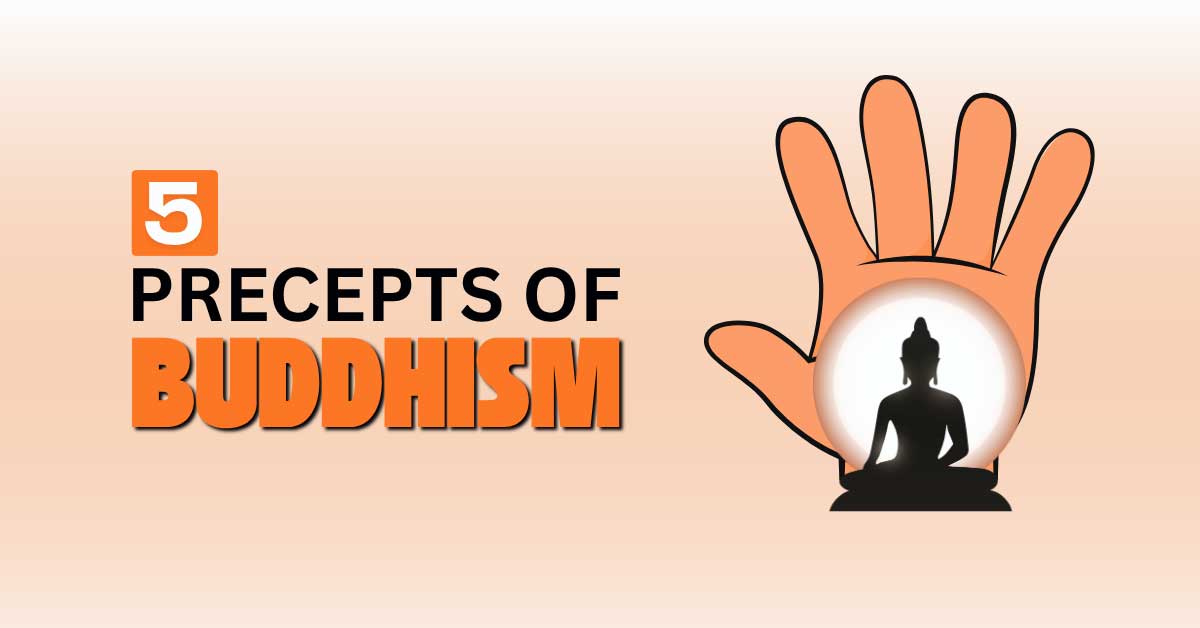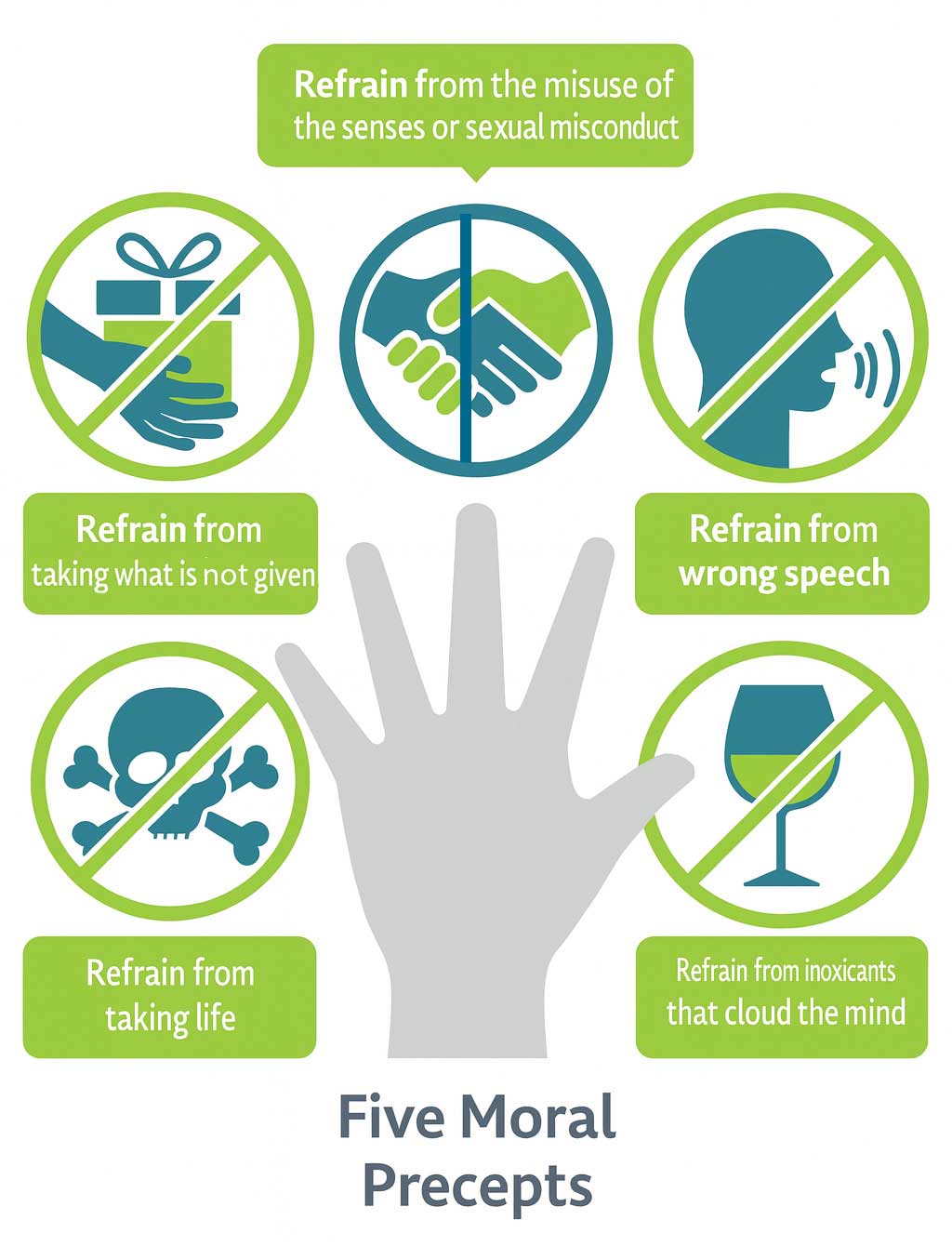Five Precepts of Buddhism
Last Updated: October 03, 2025
Tweet

The Five Precepts (Pañca-sīla in Pali) are the moral backbone of lay Buddhist practice. Given by the Buddha himself, these are not divine commandments. They are voluntary commitments, taken freely, practiced sincerely.
You don’t have to be a monk or nun to walk the Buddhist path. These five principles are for ordinary people navigating daily life, students, travelers, parents, professionals. If followed with mindfulness, they become the foundation for peace, discipline, and deeper insight.
Who Gave the Five Precepts?
The Five Precepts were first taught by Siddhartha Gautama, the Buddha, around 2,500 years ago. He introduced them not as rigid laws, but as practical guidelines for ethical living. Unlike rules handed down from a god, the precepts are based on cause and effect. When you act with awareness and restraint, you suffer less, and so do the people around you.
The Buddha gave these teachings to laypeople as a way to live non-harmfully, support spiritual development, and contribute to social harmony. They are still recited and reaffirmed by millions across the world, often at the start of retreats, ceremonies, or daily practice.
Please click here to get the complete details on available placement, classes, accommodation, cost, visa, airport arrival and the rest of it.
Get More Info Now »
The Five Precepts Explained
Each precept is traditionally worded as a vow of restraint: “I undertake the training to abstain from…” But it’s helpful to also understand what you’re cultivating, not just what you’re avoiding.

1. Refrain from Killing (Pānātipātā veramaṇī sikkhāpadaṃ samādiyāmi)
Positive Quality: Compassion and reverence for life
This precept encourages you not to harm any living being, human, animal, or insect. It promotes non-violence (ahimsa), not just in action, but also in attitude. For some, this leads to vegetarianism or a conscious effort to avoid killing even small creatures unnecessarily.
It's less about perfection, more about intention. The point is to value life and avoid causing pain.
2. Refrain from Stealing (Adinnādānā veramaṇī sikkhāpadaṃ samādiyāmi)
Positive Quality: Honesty and generosity
More than avoiding theft, this precept is about not taking what hasn’t been freely offered. That includes cheating, manipulating, or exploiting others for personal gain. Practicing this precept means cultivating contentment and sharing what you can.
Even small acts, giving your time, listening fully, offering help, can become a part of this.
3. Refrain from Sexual Misconduct (Kāmesumicchācāra veramaṇī sikkhāpadaṃ samādiyāmi)
Positive Quality: Respect and responsibility in relationships
This precept reminds you to act ethically in matters of intimacy. It’s not about puritanism, it’s about not harming others through desire. That includes cheating, manipulation, or inappropriate relationships.
In positive terms, it means treating others with dignity, honesty, and care, whether you're in a relationship or not.
4. Refrain from False Speech (Musāvādā veramaṇī sikkhāpadaṃ samādiyāmi)
Positive Quality: Truthful, kind communication
This goes beyond just “not lying.” It also includes gossip, slander, harsh words, and meaningless chatter. Words carry energy. This precept teaches you to speak with awareness, only when it's true, necessary, and kind.
Practicing this builds trust, clarity, and a more peaceful mind.
5. Refrain from Intoxicants (Surāmerayamajjapamādaṭṭhānā veramaṇī sikkhāpadaṃ samādiyāmi)
Positive Quality: Clarity and mindfulness
The fifth precept warns against substances that cloud the mind, like alcohol or drugs. It’s not about morality, it’s about awareness. When your mind is impaired, it’s easier to break the other four precepts.
You don’t have to be rigid. But if you value mental clarity, presence, and discipline, this precept becomes more of a support than a restriction.
Please click here to get the complete details on available placement, classes, accommodation, cost, visa, airport arrival and the rest of it.
Get More Info Now »
Why Are the Five Precepts Important?
The Five Precepts are not just about ethics, they are about creating the inner and outer conditions for awakening.
1. They Support Meditation and Mental Clarity
Ethical behavior leads to a peaceful conscience. When you sit in meditation, you’re not distracted by guilt, anxiety, or regret. The mind rests more easily. Precepts are like clearing the ground before building a stable house.
2. They Reduce Suffering (Karma)
Buddhism teaches that your actions have consequences. When you refrain from harming others, you reduce the causes of future pain, for yourself and others. Living with integrity means fewer regrets and fewer conflicts.
3. They Build Trust and Harmony
In a world where lying, stealing, and selfishness are common, someone who follows the Five Precepts stands out. These values help build strong communities based on trust and respect.
Imagine a village, family, or workplace where people naturally avoid harming one another. That’s what the precepts aim to create.
4. They Cultivate Compassion
Each precept is a form of compassion in action. By refraining from harm, you’re showing care, even to those you’ve never met. This daily practice of restraint softens the heart and sharpens awareness.
5. They Are a Practice, Not a Test
No one keeps the precepts perfectly all the time. That’s not the point. The value lies in intention and effort. If you break a precept, reflect, learn, and recommit. Buddhism doesn’t dwell on guilt, it invites mindful improvement.
Please click here to get the complete details on available placement, classes, accommodation, cost, visa, airport arrival and the rest of it.
Get More Info Now »
Applying the Precepts in Modern Life
You don’t need to wear robes or live in a cave to practice these principles. They apply to
how you eat, speak, spend, love, and think, right now.
Examples:
- Instead of swatting an insect, gently move it.
- Speak honestly in difficult conversations.
- Think before reposting gossip online.
- Choose not to drink before driving or meditating.
- Reflect before making decisions that affect others.
Conclusion
The Five Precepts are not about perfection. They are about living with
awareness, compassion,
and clarity, one choice at a time. They are a baseline, not a burden. A practice, not a
punishment.
In a world that often rewards speed, distraction, and self-interest, these simple commitments
invite you to slow down, notice the impact of your actions, and choose a path that benefits
everyone, including yourself.
|| You might be also interested: The Four Noble Truths of Buddhism >>
Frequently Asked Questions (FAQs)
Are the Five Precepts the same for everyone?
Yes, but interpretations vary slightly by tradition. Monks and nuns follow additional precepts, but these five are the base for all lay practitioners.
Do I have to be Buddhist to follow the precepts?
No. Anyone can practice them. They are universal principles that benefit any human being.
What happens if I break a precept?
You reflect, acknowledge it, and recommit. There’s no punishment, just the opportunity to learn and grow.
Do the precepts apply to diet?
The first precept can lead some to vegetarianism, but it’s not required. The focus is on intention and minimizing harm.
Why avoid alcohol or drugs?
Because they impair mindfulness. If you value awareness and clarity, this precept becomes a natural support.
To share this link:
Please click here to get the complete details on available placement, classes, accommodation, cost, visa, airport arrival and the rest of it.
Get More Info Now »


